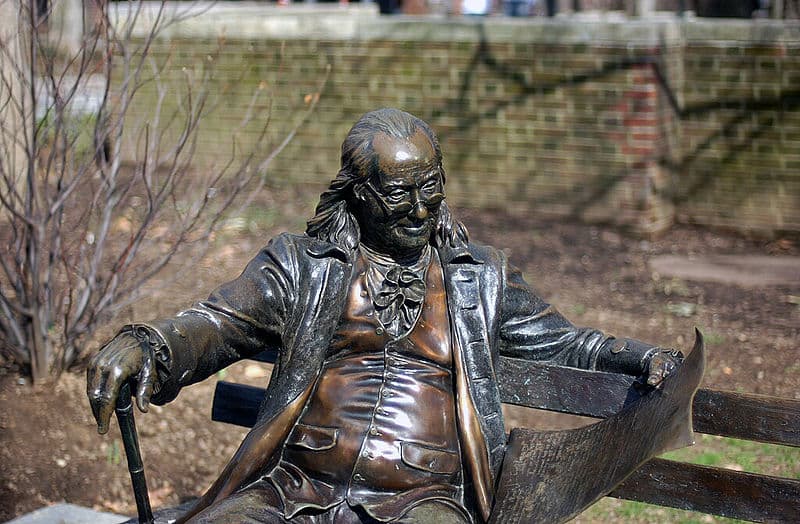The Cocktail Party Contrarian: ‘Palestine Writes Festival’ at Penn Celebrates More Antisemitism Than Literature
University’s president shrinks from a defense of the Jews.

What a surprise. The Palestine Writes Literature Festival, which took place last week at my alma mater, the University of Pennsylvania, highlighted more of the organizing group’s antisemitic interests than its literary ones.
Featured speakers included those who call Jews Nazis, profess support for terrorists, and favor the idea of the Jewish State being emptied of its Jews. Marc Lamont Hill and Roger Waters were the names most prominently associated with the event, and neither is a Palestinian author.
It is hard to be shocked anymore by the tactics of those who purport to speak for the oppressed. The celebration of victimhood requires the identification of a victimizer, and for reasons that none dare speak the Jews are often chosen for the role.
My fellow alumni were stunned, however, that 36 faculty members at one of the country’s premier academic institutions were eager to support the event with a halo of humanities. They were further disappointed in Penn’s president, Elizabeth Magill, who issued a boilerplate public statement.
Ms. Magill said all the correct things about the school’s commitment to free speech and its opposition to antisemitism. She took a weak tone, however, and lacked the energy one would have expected had any other minority group been targeted on her campus.
No one should be surprised. Postmodernism, Marxism, equity, and identity politics — disguised as “social justice” — have been seeping into our schools for decades. When that happens two things can be counted on: the degradation of leadership and the rolling out of the welcome mat for antisemitism.
When Lia, née William, Thomas first jumped into the women’s pool at Penn in 2019, there was no serious objection. Certain members of the school community were actively discriminated against so other designated “marginalized” students could gain an advantage they were somehow “owed.”
Jews now being labeled “colonialist oppressors” on campus might regret not doing more back then to defend the so-called “transphobes” who were derided for their intolerance when they pointed out the absurdity of the swimmer’s claim and Penn’s embrace of it. How can those who looked the other way when common sense became beside the point expect it to be restored now for their own protection?
We can certainly argue that administrators have a responsibility to speak out more forcefully about the antisemites’ speech at last week’s event. Yet the school has been empowered to selectively police speech based on its own estimation of what constitutes “good” or “bad” for some time.
As proceedings began in 2019 to sanction and remove Penn law school professor, Amy Wax, too few Jewish alumni imagined that allowing “hate speech” monitors to pick and choose winners and losers would come back to bite them. Professor Wax’s comments, after all, weren’t in the same solar system of bigotry as those of the executive director of the literary festival, Susan Abulhawa. Yet acceptability is now in the eye of the beholder, and the beholder is not always sensitive to the Jews.
Those who think “hate speech” is not protected speech and who only see it as something in which their political opponents engage, don’t hear “From the River to the Sea, Palestine Shall Be Free” as threatening. They make the ultimate decisions, and we told them they could.
We traded in the First Amendment for emotional satisfaction and intersectionality, and now have the Anti-Defamation League, which has perfected speech-policing, trying to represent the very Jewish interests at Penn it helped to endanger by striking this bargain in the first place.
In a petition promoted by the ADL and circulated among Penn alumni who are earnestly concerned about the safety of Jewish students on campus, there is a call for President Magill to “develop and implement mandatory antisemitism awareness training across the University, including in new student orientation programming and DEI (diversity, equity and inclusion) programming for students, faculty and staff.”
Nothing would serve Jews at Penn more disastrously. What Penn alumni should be demanding is the eradication of all DEI programs and personnel across the university and the enactment of a Chicago Principles-style free speech policy document governing the entire school. Those would do more to reduce antisemitism on campus than almost anything else.
The kind of antisemitism we saw at Penn last week is the natural outgrowth of a larger agenda we didn’t do enough to curtail. No more DEI, no more victim Olympics. Speech can’t be policed by those just trying to “help,” and inherited victim status must be rejected.
Equity should be laughed out of serious conversation, and “hate speech” should be erased from our vocabulary. If these aren’t our values, then neither is the safety of Jews, or anyone else, on any campus or in this country.

